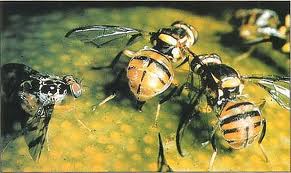
Submitted by the office of Dave Roberts, San Diego County Board of Supervisors
It began as a routine, September day in Del Mar for the county insect detection specialist. But by the time it was over, the technician had trapped an exotic pest that, if unchecked, can trigger quarantines, destroy crops and cause serious losses within the county’s $1.8 billion agricultural economy.
The trapper had caught two, yellow-striped specimens. Within a day, the insects were confirmed as male Oriental fruit flies by authorities at a California Department of Food and Agriculture lab. State agricultural officials, with support from the county’s Department of Agriculture, Weights and Measures, quickly deployed dozens of “delimitation” traps along a 4 ½-mile radius from the find site and pored over the area in search of infestations.
Fortunately, they found none. Elsewhere in the county during recent months, trappers have found Oriental fruit flies in 4S Ranch and Escondido. Commercial growers will not suffer impacts unless more flies are detected.
Agricultural officials say that the discovery of five more males or a mated female or larva would trigger an agricultural quarantine. Oriental fruit flies are known to lay their eggs within 230 different kinds of fruits and vegetables. Once the eggs hatch, the maggots tunnel through the fruit and destroy the pulp. Then they exit the pulp and continue their life cycle by pupating in the soil. Local authorities say their biggest concerns are infestations of citrus or avocado orchards. Last year’s avocado harvest was valued at $154 million.
Locally, avocados are the commodity that cover the greatest amount of planted acreage. “Infestations can cause a complete loss of crops,” said Priscilla Yeaney, a deputy county agricultural commissioner specializing in pest prevention. Escondido is home to 316 acres of production nurseries and 2,118 acres of avocados, citrus, tomatoes, grapes and persimmons.
A quarantine would impact all of them. How can you help? Deputy Commissioner Yeaney says Oriental fruit flies often arrive in fresh fruit or soil that is shipped to California in packages or through the mail. Fruit that looks perfectly good could have fruit fly maggots or eggs hidden beneath the skin. Please cooperate with agricultural officials if they ask to hang a trap on your property.
Every work day, about two-dozen insect detection specialists cover the county to service traps and look for bad bugs. The county’s pest-detection program also includes detector dogs that sniff out unauthorized shipments at FedEx and postal service transfer stations. The county employs an in-house entomologist and pathology team that is able to quickly identify suspicious pests.
Did you know that agriculture covers 420 square miles within the county? Our farmers produce more than 200 different agricultural commodities. Thank you for supporting our agricultural industry and the county officials who do so much to protect it.
Dave Roberts represents the Third District on the San Diego County Board of Supervisors, http://www.supervisordaveroberts.com/
Note: If you have a news item to share, please submit your story through UCCA’s Contact Us link at https://www.universitycitynews.org/contact-us-or-volunteer-in-uc/.
Review article guidelines at https://www.universitycitynews.org/ucca-newsletter-archives/
What do Facebook, Twitter, Nextdoor, ImproveUC and UCCA have in common?
They are all ways neighbors can connect with neighbors and the University City community. Create a post, start a conversation, share the news, organize an event, keep in touch, take a look:
- Facebook – https://www.facebook.com/universitycitycommunityassociation
- Twitter – https://twitter.com/UCCA_SD
- Nextdoor – https://nextdoor.com/sandiego/
- ImproveUC – http://improveuc.org/
- UCCA – https://www.universitycitynews.org/


